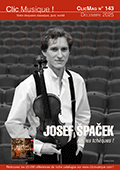 Lorsque le cardinal Karl Lehmann, archevêque de Mayence, céda sa place en 2017 à l’abbé Peter Kohlgraf, le tout nouveau prélat demanda au Kapellmeister de la cathédrale, Karsten Storck, et à ses musiciens de programmer la messe en fa de Bruckner. C’est ce concert donné le 29 avril 2018 qui figure sur ce CD. Loin des visions symphoniques de chefs comme Barenboim, Celibidache, Davis ou Jochum, c’est bien une conception avant tout liturgique que restitue cette exécution. Les solistes ne sont pas des chanteurs célèbres, le chœur imposant est l’élément fort de l’interprétation, et tout l’ensemble est tourné vers les voutes de la cathédrale et non vers une salle de concert. Il est dès lors vain de comparer ce disque avec ceux des grands chefs cités plus haut, tant il se situe dans une tout autre esthétique. Mais c’est sans doute cet état d’esprit qui animait Bruckner lorsqu’il écrivit cette messe, tout comme celui des premiers interprètes. Un retour aux sources rafraichissant et salutaire… (Richard Wander)  When the clergyman Peter Kohlgraf succeeded the extremely popular Bishop of Mainz Cardinal Karl Lehmann in 2017, he requested a performance of Anton Bruckner’s F minor Mass by Domkapellmeister Karsten Storck and his musicians. This CD is a live recording of the concert on 29 April 2018, about which the critic from the Allgemeine Zeitung Mainz wrote: it was “filled with moments of a heavenly beauty of sound. Choir and orchestra melded into a captivating cosmos in whose heavens the soloists with their radiant voices shone like stars.” The solo quartet consisting of Jutta Hörl (soprano), Gudrun Pelker (alto), Thorsten Büttner (tenor) and Derrick Ballard (bass) throw Bruckner’s impressively realized drama into relief, together with the lavish vocal forces of the Mädchenchor am Dom und St. Quintin (girls’ choir), the St. Martin’s cathedral choir, and the male voices of the Mainzer Domchor (boys’ choir) and the cathedral orchestra. Moving transcendence is brought together here with powerful sound, reflecting the composer’s unshakable faith in symphonic thought as a means of proclamation, and reaffirming Bruckner to be, as he became known, “God’s own musician”.
 |
